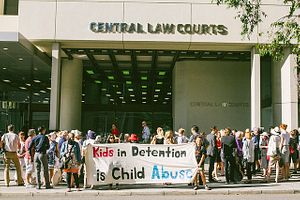I’ve walked through Australia’s detention center on Manus Island, Papua New Guinea, and seen first-hand the truly harmful conditions inside.
In one room there were more than 100 bunk beds (for 200 men) crammed so close together you could barely walk between them. There were guards everywhere, giving the whole place an ominous prison-like feel. Wherever I walked I was swamped by hundreds of men desperate for someone – anyone – to hear their story and give them some hope for a better future.
Detaining 900 innocent people in that environment for three years is incredibly cruel. The highest court in Papua New Guinea has now ruled that it’s illegal and PNG Prime Minister Peter O’Neill has conceded it must end.
The unanimous court ruling and the PNG government’s response are fitting in so many ways.
It’s fitting that PNG sovereignty, so often used as a shield by successive Australian governments to fend off criticism of the Manus camp, has now become the sword, striking a blow to the core of the current detention arrangements.
It’s fitting, too, that the rule of law has finally managed to reach the Manus facility, despite the great lengths and expense Australia has gone to in the hope of keeping its remote offshore camps beyond legal and democratic scrutiny (including funding the PNG government’s defense to similar legal challenges in the past.)
There’s also something fitting about the fact that the case was commenced by an opposition MP. Deliberate harm to innocent people seeking asylum has been a highly contested political issue in PNG. The contrast to the meek bipartisanship Australians have become accustomed to on this issue couldn’t be starker.
Most of all, the Supreme Court ruling is fitting because it finds that what we know is cruel, harmful, and fundamentally unjust is also illegal.
No doubt the Supreme Court’s decision and subsequent announcement from the PNG government will give the men languishing on Manus some hope. And so it should – the implications are huge. Right now 900 men are being illegally detained. Every one of them must be released.
The question is to where.
Resettlement in PNG is completely unrealistic. Access to land, work, services and communities will be limited and there are serious personal safety and security issues – all key reasons why hardly anyone has actually been resettled in the three years since the resettlement deal was announced.
Just flinging the gates open isn’t a solution either. Tinkering around the edges of the arrangements won’t address the fundamental injustice of continuing to leave such a large group of innocent people languishing on a remote island, stuck on a painful road to nowhere.
The Nauru camp is equally harmful and is currently engulfed by tragedy and crisis. Just last week a desperate man, fatigued after three years in limbo, set fire to himself and died. Omid was only 23 years old and a recognized refugee. He left behind a wife, a family and unfulfilled hopes for a better, safer future.
The only viable and humane next step is the most obvious one – bring them here to Australia.
More broadly, events in PNG and Nauru add to a growing list of reasons why Australia’s current policies are completely unsustainable and must be overhauled.
First, they rest on a legal framework that is looking increasingly unstable. The Manus detention facility is now illegal, it took retrospective legal changes and a last minute opening of the gates to fend off a similar legal challenge to the Nauru facility and serious questions remain about the lawfulness of boat turn-backs.
Second, corporate willingness to participate in the arrangements is dwindling. Broadspectrum, the company which holds contracts for both offshore centers, is the subject of a takeover bid from Spanish company Ferrovial, which has signaled its intention to walk away from Australia’s offshore detention regime like the legal and reputational minefield that it is.
Third, public opinion is shifting. In just the last few months we’ve seen doctors risk jail to speak out, more than 100 churches around Australia open their doors and offer sanctuary to people facing deportation, and teachers and school principals take a stand on behalf of students at risk of being ripped from classrooms and returned to Nauru. The trajectory of public opinion is clear – people are realizing that the status quo is unsustainable, cruel and fundamentally wrong.
Fourth, and most importantly, for every minute the current arrangements remain in place innocent people continue to suffer. I’ve sat face to face with women in Australia who have been sexually assaulted on Nauru, so terrified of being sent back that they can’t sleep. I’ve listened to parents tearfully describe the deterioration in their child’s mental state in offshore detention. I’ve seen the desperation inside the Manus camp. There’s no doubt the current policies are causing serious harm.
A government in election mode will continue to scramble to act like everything is fine, but the reality is the current situation is a mess. Whoever wins the election must look at innovative, humane policy alternatives.
The true policy challenge we must address is that there are desperate people in our region who need protection. Our goal should be to ensure they can access it safely. Instead of using costly and cruel measures to close unsafe pathways we need to look at smart ways of opening up new ones. Measures which improve conditions in transit countries and re-allocate skilled migration places to skilled people who are also seeking asylum should be considered.
It is complex policy challenge, but continuing to harm innocent people is not the solution. It’s time to bring them to Australia.
Daniel Webb is the director of Legal Advocacy at the Human Rights Law Centre in Australia. He is on Twitter @DanielHRLC.

































